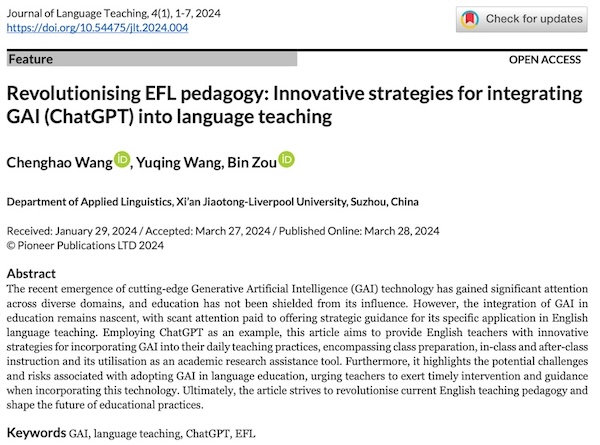Revolutionising EFL pedagogy: Innovative strategies for integrating GAI (ChatGPT) into language teaching
DOI:
https://doi.org/10.54475/jlt.2024.004Keywords:
GAI, language teaching, ChatGPT, EFLAbstract
The recent emergence of cutting-edge Generative Artificial Intelligence (GAI) technology has gained significant attention across diverse domains, and education has not been shielded from its influence. However, the integration of GAI in education remains nascent, with scant attention paid to offering strategic guidance for its specific application in English language teaching. Employing ChatGPT as an example, this article aims to provide English teachers with innovative strategies for incorporating GAI into their daily teaching practices, encompassing class preparation, in-class and after-class instruction and its utilisation as an academic research assistance tool. Furthermore, it highlights the potential challenges and risks associated with adopting GAI in language education, urging teachers to exert timely intervention and guidance when incorporating this technology. Ultimately, the article strives to revolutionise current English teaching pedagogy and shape the future of educational practices.
References
Cai, Q., Lin, Y., & Yu, Z. (2023). Factors influencing learner attitudes towards ChatGPT-assisted language learning in higher education. International Journal of Human–Computer Interaction, 1–15. https://doi.org/10.1080/10447318.2023.2261725 DOI: https://doi.org/10.1080/10447318.2023.2261725
Cao, Y., Li, S., Liu, Y., Yan, Z., Dai, Y., Yu, P. S., & Sun, L. (2023). A comprehensive survey of AI-Generated Content (AIGC): A history of generative AI from GAN to ChatGPT [Archive]. https://doi.org/10.48550/arXiv.2303.04226
Chiu, T. K. F., Xia, Q., Zhou, X., Chai, C. S., & Cheng, M. (2023). Systematic literature review on opportunities, challenges, and future research recommendations of artificial intelligence in education. Computers and Education: Artificial Intelligence, 4, Article 100118. https://doi.org/10.1016/j.caeai.2022.100118 DOI: https://doi.org/10.1016/j.caeai.2022.100118
Guo, K., & Wang, D. (2023). To resist it or to embrace it? Examining ChatGPT’s potential to support teacher feedback in EFL writing. Education and Information Technologies. https://doi.org/10.1007/s10639-023-12146-0 DOI: https://doi.org/10.1007/s10639-023-12146-0
Hu, J. S., & Qi, Y. J. (2023). ChatGPT shidai de Zhongguo waiyu jiaoyu: Qiu bian yu ying bian [Foreign language education in China in the era of ChatGPT: Seeking changes and responding to changes]. Wai Yu Dian Hua Jiao Xue, (1), 3-6. https://www.nssd.cn/html/1/156/159/index.html?lngId=WYDHJX2023001001
Jeon, J., Lee, S., & Choe, H. (2023). Beyond ChatGPT: A conceptual framework and systematic review of speech-recognition chatbots for language learning. Computers & Education, 206, Article 104898. https://doi.org/10.1016/j.compedu.2023.104898 DOI: https://doi.org/10.1016/j.compedu.2023.104898
Jimenez, K. (2023, January 30). ‘This shouldn’t be a surprise’ The education community shares mixed reactions to ChatGPT. USA Today. https://www.usatoday.com/story/news/education/2023/01/30/chatgpt-going-banned-teachers-sound-alarm-new-ai-tech/11069593002/
Kasneci, E., Sessler, K., Küchemann, S., Bannert, M., Dementieva, D., Fischer, F., Gasser, U., Groh, G., Günnemann, S., Hüllermeier, E., Krusche, S., Kutyniok, G., Michaeli, T., Nerdel, C., Pfeffer, J., Poquet, O., Sailer, M., Schmidt, A., Seidel, T., … Kasneci, G. (2023). ChatGPT for good? On opportunities and challenges of large language models for education. Learning and Individual Differences, 103, Article 102274. https://doi.org/10.1016/j.lindif.2023.102274 DOI: https://doi.org/10.1016/j.lindif.2023.102274
Nazir, A., & Wang, Z. (2023). A comprehensive survey of ChatGPT: Advancements, applications, prospects, and challenges. Meta-Radiology, 1(2), Article 100022. https://doi.org/10.1016/j.metrad.2023.100022 DOI: https://doi.org/10.1016/j.metrad.2023.100022
Pack, A., & Maloney, J. (2023). Using generative artificial intelligence for language education research: Insights from using OpenAI ‘s ChatGPT. TESOL Quarterly, 57(4), 1571–1582. https://doi.org/10.1002/tesq.3253 DOI: https://doi.org/10.1002/tesq.3253
Pozas, M., Letzel, V., & Schneider, C. (2020). Teachers and differentiated instruction: Exploring differentiation practices to address student diversity. Journal of Research in Special Educational Needs, 20(3), 217–230. https://doi.org/10.1111/1471-3802.12481 DOI: https://doi.org/10.1111/1471-3802.12481
Wan, Y., & Moorhouse, B. L. (2024). Using Call Annie as a generative artificial intelligence speaking partner for language learners. RELC Journal, Advance online publication. https://doi.org/10.1177/00336882231224813 DOI: https://doi.org/10.1177/00336882231224813
Wang, X., Li, L., Tan, S. C., Yang, L., & Lei, J. (2023). Preparing for AI-enhanced education: Conceptualising and empirically examining teachers’ AI readiness. Computers in Human Behavior, 146, Article 107798. https://doi.org/10.1016/j.chb.2023.107798 DOI: https://doi.org/10.1016/j.chb.2023.107798
Wu, J., Gan, W., Chen, Z., Wan, S., & Lin, H. (2023). AI-Generated Content (AIGC): A survey [Archive]. https://doi.org/10.48550/arXiv.2304.06632
Skrabut, S. (2023). 80 ways to use ChatGPT in the classroom: Using AI to enhance teaching and learning. Stanley A. Skrabut.
Stewart, J. (2023, February 17). Noam Chomsky says ChatGPT is a form of “High-Tech Plagiarism”. My Modern Met. https://mymodernmet.com/noam-chomsky-chat-gpt/
Sun, G.H., & Hoelscher, S.H. (2023). The ChatGPT storm and what faculty can do. Nurse Educator, 48(3), 119–124. https://doi.org/10.1097/NNE.0000000000001390 DOI: https://doi.org/10.1097/NNE.0000000000001390
Zou, B., Guan, X., Shao, Y., & Chen, P. (2023). Supporting speaking practice by social network-based interaction in Artificial Intelligence (AI)-assisted language learning. Sustainability, 15(4), 2872. https://doi.org/10.3390/su15042872 DOI: https://doi.org/10.3390/su15042872

Downloads
Published
Issue
Section
License
Copyright (c) 2024 Journal of Language Teaching

This work is licensed under a Creative Commons Attribution 4.0 International License.





